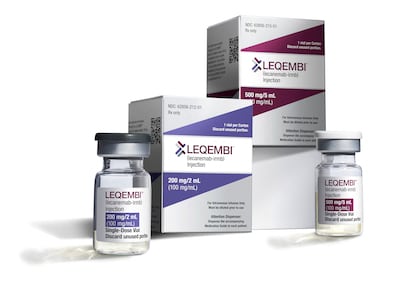Alzheimer's drug Leqembi has this week been given approval by the US Food and Drug Administration, but some researchers warn that its impact is limited.
The drug, which was found in clinical trials to slow the progression of the disease in 27 per cent of patients in the early stages of Alzheimer’s, could also be rolled out to other parts of the world.
Also known as Lecanemab, it is the second major drug to have emerged to treat Alzheimer’s after Aduhelm, or Aducanumab, was given the green light by the FDA just over two years ago.
Aducanumab’s approval in the US was highly disputed and raised concerns from some scientists that data from clinical trials failed to show convincing evidence of the drug’s effectiveness. European regulators did not give the go-ahead for the drug to be used.
With Leqembi, researchers say there is a clearer indication that treatment really can remove the fatty deposits, called beta-amyloid plaques, that build up in the brain of Alzheimer’s patients.

“I think this [approval] is really good news for people who are at risk or who feel at risk,” said Prof Paul Matthews, head of the Department of Brain Sciences at Imperial College London and an associate director of the UK Dementia Research Institute.
With Leqembi there is clearer evidence than with Aduhelm that treatment slows the rate at which people with Alzheimer’s disease lose their ability to think well, according to Prof Matthews.
How they work
Both Leqembi and Aduhelm contain antibodies that bind to the beta-amyloid material that builds up, but they attach in different ways and this could be why, Prof Matthews said, there is a difference in their ability to pull beta-amyloid out of the brain or to interfere with its effect on the brain.
“[Leqembi/Lecanameb] is the first drug that gives us real confidence that we cannot just slow the progression of the changes in the brain, but we can slow them to good effect for people’s health and thinking,” he added.

Leqembi, which like Aduhelm has been launched by the drug companies Eisai and Biogen, received what is called standard approval from the FDA, the news agency Reuters reported this week, following more restricted “accelerated” approval early this year.
However, in giving wider approval, the regulator warned that Leqembi increases the risk of brain swelling and bleeding, which in extreme cases can prove fatal.
"These side effects are being studied extensively by our group and we conclude that they are due to a failure of clearance of Abeta [amyloid beta]," said Prof Roxi Carare, who researches methods to diagnose and treat dementia at the University of Southampton in the UK.
"By solubilising more Abeta after treatment, it blocks the drainage pathways [that are] already compromised."
There is no evidence from the clinical trials that Leqembi can cause actual improvements in patients or stop the disease from progressing. Instead, the results suggest that in some patients Leqembi may slow deterioration.
What is Alzheimer's disease?
About two-thirds of dementia cases are caused by Alzheimer’s disease, which is associated with a loss of connection between the brain’s neurons or nerve cells.
People with the condition may experience memory loss, altered behaviour and speech problems, among other things, although symptoms typically emerge only after many years of unrecognised changes in the brain.
Not all dementia researchers are convinced that Leqembi represents a significant step forward. Rob Howard, professor of old age psychiatry at University College London, said that the drug’s impact was limited.
“The treatment differences are tiny – about half of what other people would accept – probably not what you would regard as clinically noticeable or effective,” he said.

“My argument, as someone who looks after people with dementia, is what I want are drugs that are clinically effective and part of that is that they have an effect big enough to see, and they’re safe to take. The problem is it doesn’t have enough of an effect to see an effect in individual patients.”
In the UK, he said, the National Institute for Health and Care Excellence, which determines which drugs are effective and offer value for money, may well decide that Leqembi does not offer sufficient benefits for its cost, which in the US is reported to be $26,500 per patient annually.
Also in the UK, Dr Ivan Koychev, a senior clinical researcher in the Department of Psychiatry at the University of Oxford, said that the drug would require “the complete overhaul” of memory clinics. This would be needed to allow the drug to be given intravenously, to facilitate genetic testing to identify those most at risk of side effects and to give regular MRI scans to check for these side effects.
While he said that people who raised concerns were right that the results “were not particularly impressive for the patients themselves”, the drug raised the prospect of increased investment that could lead to better treatments.
The beta-amyloid is known to build up in the brain of individuals who develop Alzheimer’s disease for up to two decades or more before symptoms start to show.
This suggests, Dr Koychev said, that if the drug were to be given to people much earlier, before symptoms developed, it may have more of an effect.
“It may be that’s when you get the real benefit,” he said. “That’s yet to be proven. It may be that’s not how it works.”
Such preventive efforts would require the early identification of individuals who are likely to go on to develop symptoms of Alzheimer’s disease.
Prof Matthews said that considerable efforts were being made to improve such early recognition. Ultimately, he suggested, GPs might be able to carry out additional blood tests on people when they go for a check up to highlight those who may benefit from pre-emptive treatment.
“This would identify those who should be followed up, who may be developing this early preclinical disease,” he said.


